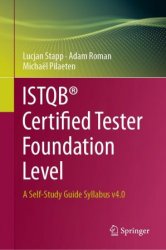ISTQB Certified Tester Foundation Level: A Self-Study Guide Syllabus v4.0
- Добавил: literator
- Дата: 26-11-2023, 19:47
- Комментариев: 0
 Название: ISTQB Certified Tester Foundation Level: A Self-Study Guide Syllabus v4.0
Название: ISTQB Certified Tester Foundation Level: A Self-Study Guide Syllabus v4.0Автор: Lucjan Stapp, Adam Roman, Michaël Pilaeten
Издательство: Springer
Год: 2024
Страниц: 409
Язык: английский
Формат: pdf (true)
Размер: 11.7 MB
This book is aimed at everyone preparing for the ISTQB Certified Tester – Foundation Level exam based on the Foundation Level syllabus (version 4.0) published in 2023. It provides candidates with reliable knowledge based on this document and thus distinguishes itself from all the information about ISTQB syllabi and exams on the Internet, which is often of rather poor quality and may even contain serious errors.
The system created by ISTQB allows defining career paths for testing professionals based on a three-level certification program that includes Foundation Level, Advanced Level, and Expert Level. The entry point is the Foundation Level described in this book. Holding the Foundation Level certification is a prerequisite for earning subsequent certifications. The holders of a Foundation Level certificate can expand their knowledge of testing by obtaining an Advanced Level qualification. At this level, ISTQB offers a number of educational programs. In terms of the basic path, there are three possible programs:
• Technical Test Analyst (technology oriented, non-functional testing, static analysis, white-box test techniques, working with source code)
• Test Analyst (customer oriented, business understanding, functional testing, black-box test techniques, and experience-based testing)
• Test Manager (test process and test team management oriented)
The advanced level is the starting point for acquiring further knowledge and skills at the expert level. A person who has already gained experience as a test manager, for example, can choose to further develop their career as a tester by obtaining expert-level certifications in the areas of test management and test process improvement. In addition to the core track, ISTQB also offers specialized education programs on topics such as acceptance testing, artificial intelligence testing, automotive testing, gaming machine testing, game testing, mobile application testing, model-based testing, performance testing, security testing, test automation, or usability testing. In terms of agile methodologies, it is Technical Agile Tester or Agile Test Leadership at Scale.
Testing of software enables the assessment of software quality and contributes to reducing the risk of software failure in action. Therefore, good testing is essential for project success. Software testing is a set of activities carried out to facilitate the detection of defects and evaluate the properties of software artifacts. Each of these testing artifacts is known as the test object. Many people, including those working in the IT industry, mistakenly think of testing as just executing tests, that is, running software to find defects. However, executing tests is only part of testing. There are other activities involved in testing. These activities occur both before (items 1–5 below) and after (item 7 below) test execution. These are:
1. Test planning
2. Test monitoring and test control
3. Test analysis
4. Test design
5. Test implementation
6. Test execution
7. Test completion
Some people think that testing is about debugging. However, it is important to remember that testing and debugging are two different activities. Testing (especially dynamic testing) is supposed to reveal failures caused by defects. Debugging, on the other hand, is a programming activity performed to identify the cause of a defect (fault), correcting the code and verifying that the defect has been correctly fixed. When static testing discovers a defect, the debugging process is simply to eliminate the defect. It is not necessary, as in the case of failure discovery in dynamic testing, to perform failure reproduction and diagnosis, because in static testing, the work product under test is not run. The related source code might not even have been created. This is because static testing does not find failures but directly identifies defects.
Target Audience:
The Foundation Level qualification is designed for anyone interested in software testing. This may include testers, test analysts, test engineers, test consultants, test managers, users performing acceptance testing, agile team members, and developers. In addition, the Foundation Level qualification is suitable for those looking to gain basic knowledge in software testing, such as project managers, quality managers, software development managers, business analysts, CIOs, and management consultants.
Скачать ISTQB® Certified Tester Foundation Level: A Self-Study Guide Syllabus v4.0
[related-news] [/related-news]
Внимание
Уважаемый посетитель, Вы зашли на сайт как незарегистрированный пользователь.
Мы рекомендуем Вам зарегистрироваться либо войти на сайт под своим именем.
Уважаемый посетитель, Вы зашли на сайт как незарегистрированный пользователь.
Мы рекомендуем Вам зарегистрироваться либо войти на сайт под своим именем.
